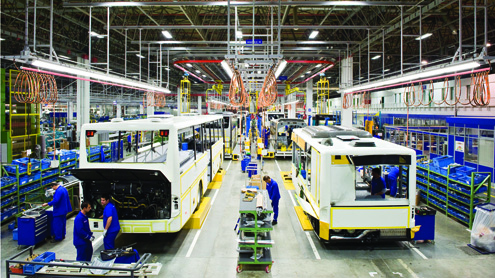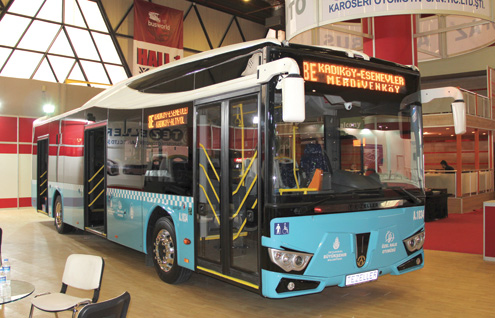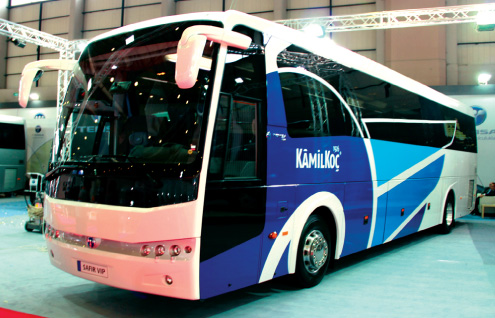
By Doug Jack

I make no apology for writing about the Turkish market and industry for the second time in less than a year. The principal reason for my visit this time was the fourth edition of Busworld Turkey, held in Istanbul in April. Almost 12,000 visitors came to the exhibition, including 1,350 from other countries. Istanbul is major regional hub, and it helped that the exhibition centre was almost in the sight of the main international airport.
Turkey has adopted European regulations for the construction of buses and coaches, a sensible move given that it supplies many vehicles to customers in European Union countries. It also has the same Euro 5 emission standards as the EU and will adopt Euro 6 two years later than the EU in January 2016.
With levels of car ownership rising and Istanbul becoming extremely congested the authorities are pushing ahead with investment in city buses. They now require all vehicles larger than minibuses to be accessible, meaning they will phase out the old high-floor vehicles over time.
The main cities cannot afford to invest in all the new buses that they need, therefore many routes are contracted out to private bus companies for a five or six year period.
Istanbul is a kaleidoscope of colors on buses. IETT, the municipal company, mainly runs older buses in a red and white scheme, with more recent vehicles in dark green or medium blue. The buses of the private contractors are normally either light blue or purple, and all carry the crest of the Istanbul Metropolitan Authority.
Although all the buses in Istanbul appear to be diesel powered, those in a number of other cities including the capital, Ankara use compressed natural gas. Pipelines pass through Turkey from countries further east to a major port on the Turkish Mediterranean coast. They trade for transit fees with gas. Although consumption per mile is about 1.5-1.6 times higher per mile than diesel, gas can make economic sense.
MAN, the German manufacturer, has a large factory outside Ankara. It recently secured an order for 250 low-floor articulated CNG buses from EGO, the principal operator in the city. EGO claims to have the largest fleet of CNG buses in the world.
Although the government gives no incentive either to manufacturers or operators to invest in hybrid and other advanced types of buses, that has not stopped the manufacturing industry from making significant developments.
Otokar is a major Turkish company that makes buses and coaches, semi-trailers for trucks, and military vehicles, including Turkey’s main battle tank. Otokar’s star exhibit was the Vectio Electra, an all-electric low-entry midibus. It uses lithium-iron magnesium phosphate batteries that, in ideal conditions, give the bus a range of 175 miles.
The Electra is fitted with a six-speed robotic transmission that changes gear according to the demand on the electric motor. Otokar reckoned that most competitors used two-speed transmissions.
Temsa had a large stand, including a Safir VIP high specification coach, one of 10 for one of Turkey’s leading operators. Within an overall length of 42-ft 8-in, it has 2+1 seating for 37 passengers on regular express services. Passengers are willing to pay a premium for higher standards of comfort.
More buses
Temsa was also developing a full length 45-ft coach for the United States and producing a prototype in August. “We will not rush it,” says Omer Sözütek, Temsa International relations and business development director, “We want to be sure that it is perfect for American conditions. When we bring it into the market Temsa will be the only manufacturer to offer 30-, 35- and 45-foot models.”
Mercedes-Benz had a large and impressive stand with a full range of products. One that caught my eye was a high deck Travego coach, described as “Business Class,” with a 2+1 seating arrangement and a built-in infotainment system. Coaches like this cost around 15 percent more than a standard vehicle, but are popular with some operators to take on the challenge of low cost airlines.

It is rare to come across a completely new manufacturer in an exhibition, but TCV is a company that founded only 18 months ago by some former executives of Temsa. TCV showed two 35-ft, full low-floor midibuses with Iveco engines and Allison fully automatic transmissions. Built in Ankara in an unusual arrangement, production vehicles will be fitted with MAN engines and built in the MAN factory on a contract basis.
Both buses on the stand were attractively styled and very well finished. A variety of door arrangements will meet customer requirements. TCV plans to have a 40-ft bus completed by the end of June and a full-electric bus is in development.
BMC is one of the oldest established manufacturers in Turkey and offers a very comprehensive range of city and suburban buses, including the option of CNG power. Orders for the 40-ft low-floor ProCity included 300 from IETT, and a further 200 from contractors running in Istanbul.
Ashok Leyland of India is now among the top five bus manufacturers in the world. They have subsidiaries in the United Kingdom, Czech Republic and United Arab Emirates. At Busworld Turkey, Ashok Leyland showed two 27-ft buses with front mounted Cummins engines, bodied locally by Utikar. The two companies hoped to sell them not only in Turkey but also in neighboring markets and possibly North Africa. A customer in oil-rich Azerbaijan placed an order for 200 units.
Guleryuz is a company that has been around for more than 40 years, building a range of city buses including double deck, and midicoaches in a modern factory near Bursa. The most fascinating vehicle on its stand was a 37-ft open-top double deck bus that will debut at the Eurovision Song Contest when it comes to Azerbaijan. A similar vehicle recently sold to the President of Turkmenistan.
Tezeller is another company operating in the Bursa area for around 45 years. It had two examples of its distinctively styled AutoBus 40-ft low-floor city bus. These used MAN engines, with ZF gearboxes and axles. Both vehicles were due to enter service in Istanbul after the exhibition.
Eastern Turkey shares a border with Iran. That country has quite an extensive automotive industry, but currently suffering heavily because of trade sanctions. Most of the international banking system is unable to process payments from Iran for goods that they want to import.

This problem was highlighted by Oghab, an Iranian bodybuilder that works closely with Scania and can build up to 1,250 buses and coaches per annum. The company wanted to display three of its latest products, but was unable to do so because of customs difficulties. Instead, there was a large screen showing videos of the impressive factory and the company’s product range.
Good quality suppliers who can make practically every component required for a bus or coach support Turkish manufacturers. Their prices are competitive because of the low labor rates, but their quality standards are sufficiently high to meet demanding standards, like those of Mercedes-Benz and MAN.
As a final comment, perhaps the strength of the Turkish manufacturing industry can be demonstrated by the fact that not one Chinese manufacturer was present. Nowadays, at a major exhibition, that is most unusual. BR
Doug Jack is with Transport Resources in the United Kingdom.
